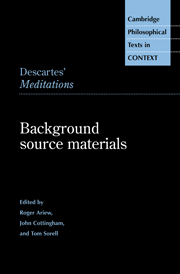Book contents
- Frontmatter
- Contents
- Preface
- Abbreviations
- General Introduction
- 1 Dialectic
- 2 That Nothing Is Known
- 3 The Promotion of Mathematics
- 4 Metaphysical Disputations
- 5 Wisdom
- 6 A Compendium of Philosophy in Four Parts
- 7 Corpus of Philosophy
- 8 The Use of Reason, The Impiety of the Deists, and The Truth of the Sciences
- 9 Unorthodox Essays against the Aristotelians
- 10 The Two Truths and The Immortality of the Soul
- 11 Dialogue on the Diversity of Religions and Little Skeptical Treatise
- 12 Universal Science
- 13 That God Exists
- Appendix: Condemnations of Cartesianism
- Bibliography
- Index
2 - That Nothing Is Known
Published online by Cambridge University Press: 05 June 2012
- Frontmatter
- Contents
- Preface
- Abbreviations
- General Introduction
- 1 Dialectic
- 2 That Nothing Is Known
- 3 The Promotion of Mathematics
- 4 Metaphysical Disputations
- 5 Wisdom
- 6 A Compendium of Philosophy in Four Parts
- 7 Corpus of Philosophy
- 8 The Use of Reason, The Impiety of the Deists, and The Truth of the Sciences
- 9 Unorthodox Essays against the Aristotelians
- 10 The Two Truths and The Immortality of the Soul
- 11 Dialogue on the Diversity of Religions and Little Skeptical Treatise
- 12 Universal Science
- 13 That God Exists
- Appendix: Condemnations of Cartesianism
- Bibliography
- Index
Summary
Introduction
Francisco Sanches, the Portuguese philosopher and medical writer, published his Quod nihil scitur at Lyons in 1581 – one year after Montaigne's Essays. To those brought up to believe in the seventeenth-century revolution in philosophy, the opening of the Nihil scitur comes as a salutary shock. Sanches “withdraws into himself” (ad memetipsum retuli) and “calls all into doubt” (omnia in dubium revocans); this is the “true way of knowing” (verus sciendi modus). The parallels, both in phrasing and in content, with what Descartes was to write sixty years later in the Meditations are remarkable. Traditional appeals to authority are swept away: Aristotle, for all his wisdom, was just wrong on many points; at the end of the day homo ut nos – he was an ordinary human being like us. To say “thus spake the Master” is unworthy of a philosopher; better, in our reasonings “to trust nature alone.”
Part of the fascination in reading Sanches is the sense it gives to the present-day reader of the arbitrariness and artificiality of standard historiographical boundaries; we are made to realize just how protracted and gradual was the parturition of the “modern age.” The Cartesian attacks on conventional philosophical jargon, on the barrenness of conventional uses of the syllogism, on the emptiness of elaborate definitions per genus et differentiam – all these are anticipated in Sanches; and if this diminishes the originality of the seventeenth-century moderns, it also enriches our understanding of the task they faced – the task of dispatching that exasperatingly resilient animal, late Scholasticism, which was able to retain its dominance for so long after its shortcomings had first been exposed.
- Type
- Chapter
- Information
- Descartes' MeditationsBackground Source Materials, pp. 8 - 23Publisher: Cambridge University PressPrint publication year: 1998



